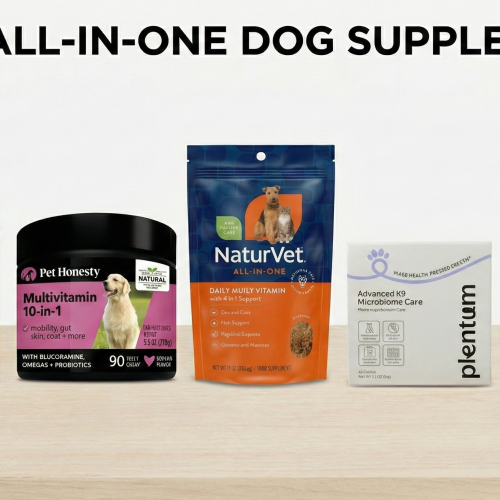Digestive emergencies in dogs happen when you least expect them—during weekend trips, late-night episodes, or holidays when your veterinarian isn’t available. Having the right probiotics in your dog’s first aid kit can provide crucial support during acute gastrointestinal distress and potentially prevent emergency vet visits.
Why Probiotics Deserve a Place in Emergency Preparedness
Acute diarrhea is among the most common reasons dog owners seek veterinary care, affecting dogs of all ages and breeds. Research consistently demonstrates that specific probiotic formulations can significantly reduce the duration and severity of acute diarrheal episodes. A landmark study of 148 dogs with acute diarrhea found that probiotic treatment reduced diarrhea duration from a median of 47 hours to just 32 hours, with dogs recovering 1.6 times faster than those receiving placebo treatment.
The emergency value of probiotics extends beyond simple diarrhea management. Probiotics can prevent antibiotic-associated digestive upset, a common concern when dogs require emergency antibiotic treatment. Research shows that 100% of dogs develop diarrhea when receiving certain antibiotics, but probiotic co-administration significantly reduces food intake disruption and vomiting episodes.
The Science Behind Emergency Probiotic Use
Multi-strain probiotic formulations demonstrate superior effectiveness compared to single-strain products in emergency situations. A study of 120 puppies with gastroenteritis found that dogs receiving multi-strain probiotics containing Lactobacillus johnsonii, Ligilactobacillus murinus, and Limosilactobacillus mucosae showed faster recovery times and improved clinical outcomes compared to placebo groups.
The mechanism behind probiotic effectiveness in acute situations involves rapid restoration of beneficial gut bacteria populations. Probiotic treatment accelerates normalization of the intestinal microbiome, as demonstrated in dogs with acute hemorrhagic diarrhea syndrome. Dogs receiving probiotics showed significant increases in beneficial bacteria like Blautia and Faecalibacterium by day 7, while control groups required 21 days to achieve similar improvements.
Research also reveals that probiotics can reduce the need for additional medical interventions. In clinical trials, only 3.5% of dogs receiving emergency probiotic treatment required further medical intervention compared to 14.8% of dogs receiving placebo treatment. This represents a significant reduction in emergency veterinary visits and associated costs.
Stress-Related Digestive Emergencies
Travel and environmental stress frequently trigger digestive upset in dogs, making probiotics essential for pet emergency kits. Studies examining stress-induced gastrointestinal changes show that transport stress significantly alters canine gut microbiota composition. Dogs undergoing transport stress experienced decreased beneficial bacteria populations and increased inflammatory markers.
Kenneling stress represents another common trigger for digestive emergencies. Research on dogs experiencing kenneling stress found that probiotic supplementation helped maintain digestive stability during stressful periods. The study revealed that stressed dogs receiving probiotics maintained better fecal consistency and showed less severe gastrointestinal disruption.
Working dogs face unique stress-related challenges that benefit from probiotic support. Federal Emergency Management Agency search-and-rescue canines subjected to helicopter transport showed physiological stress markers including elevated cortisol and increased rectal temperature. While this study didn’t examine probiotic intervention, the documented stress response supports the value of having digestive support available for working dogs during emergency deployments.
Essential Probiotic Formulations for Emergency Kits
Anti-diarrheal probiotic pastes represent the gold standard for emergency canine digestive support. The most extensively researched formulation contains Enterococcus faecium 4b1707, which demonstrated superior clinical outcomes in controlled trials. These paste formulations offer several advantages: immediate availability without refrigeration, precise dosing, and palatability that ensures dogs will accept treatment during stress.
Multi-strain powder formulations provide broader spectrum support for complex digestive emergencies. Research-backed combinations include strains of Lactobacillus, Bifidobacterium, and Streptococcus thermophilus. These formulations showed particular effectiveness in managing acute hemorrhagic diarrhea and supporting microbiome recovery.
For dogs prone to antibiotic-associated digestive upset, synbiotic formulations combining probiotics with prebiotics offer enhanced protection. Studies comparing synbiotics to traditional antibiotic treatments found that synbiotic therapy provided similar clinical benefits while preserving beneficial gut bacteria populations.
Practical Emergency Storage and Usage
Shelf-stable probiotic formulations eliminate refrigeration concerns that plague many traditional probiotic products. Spore-forming bacteria like Bacillus subtilis maintain viability at room temperature, making them ideal for emergency kits that may be stored in vehicles or travel bags. Research confirms that these formulations remain effective even after extended storage at varying temperatures.
Proper dosing during emergencies requires weight-based calculations. Clinical studies typically use dosing protocols of 200 × 10^9 CFU per 10kg body weight daily. However, emergency situations may warrant higher initial doses, with some research supporting up to 4 × 10^8 spores for immediate intervention.
Emergency probiotic administration should begin immediately when digestive upset symptoms appear. Early intervention proves more effective than delayed treatment, with studies showing that probiotics administered within the first 24 hours of symptom onset provide superior outcomes.
When Probiotics Aren’t Enough
While probiotics provide valuable emergency support, certain situations require immediate veterinary intervention. Dogs showing signs of severe dehydration, bloody diarrhea persisting beyond 24 hours, or concurrent vomiting with lethargy need professional medical attention regardless of probiotic response.
Probiotics work best as part of comprehensive emergency management rather than standalone treatment. Research emphasizes the importance of maintaining hydration, providing appropriate nutrition, and monitoring for improvement. Studies comparing probiotic-only treatment to comprehensive care consistently show better outcomes with multi-modal approaches.
Puppies and senior dogs may require modified emergency protocols. Young dogs showed particularly strong responses to probiotic intervention, with faster recovery times and reduced symptom severity. However, these populations also carry higher risks for dehydration and may need veterinary evaluation sooner than healthy adult dogs.
Building an Effective Probiotic Emergency Kit
A well-prepared canine first aid kit should include both immediate-action and sustained-support probiotic options. Emergency paste formulations provide rapid intervention capability, while powder or capsule formulations support ongoing recovery over several days. Research suggests maintaining treatment for 5-21 days depending on symptom severity and response.
Temperature stability becomes crucial for emergency preparedness. Studies examining probiotic viability under varying storage conditions recommend choosing formulations specifically tested for temperature fluctuations. Spore-forming bacteria demonstrate superior stability compared to vegetative bacterial forms, making them preferable for long-term storage.
Storage locations should consider accessibility during emergencies. Vehicle storage requires temperature-resistant formulations, while home emergency kits can accommodate a broader range of products. Research on working dog nutrition emphasizes the importance of having support readily available during unexpected situations.
The Evidence-Based Approach to Emergency Probiotics
Clinical research consistently supports probiotic use for acute canine digestive emergencies. A systematic review of probiotic effectiveness in dogs found strong evidence supporting their use for acute gastrointestinal disease management. The review identified multiple high-quality studies demonstrating reduced symptom duration, decreased severity, and improved recovery outcomes.
Comparative studies reveal probiotic superiority over traditional treatments in many emergency scenarios. Research comparing probiotics to metronidazole for acute diarrhea found that probiotics achieved faster resolution times (3.5 days vs 4.6 days) while avoiding the negative microbiome impacts associated with antibiotic use.
The evidence also supports species-specific probiotic formulations for optimal emergency effectiveness. Studies comparing canine-derived versus human-derived probiotic strains consistently show superior outcomes with dog-specific formulations, supporting the importance of choosing veterinary-designed products.
Practical Implementation for Dog Owners
Emergency probiotic protocols should be established before crises occur. Research-based guidelines suggest administering probiotics at the first sign of digestive upset, continuing treatment for at least 5 days, and monitoring for improvement within 24-48 hours. Dogs showing no improvement within this timeframe require veterinary evaluation.
Documentation of emergency interventions helps veterinarians provide appropriate follow-up care. Recording symptom onset, probiotic product used, dosing schedule, and response timeline provides valuable information for professional assessment if symptoms persist or worsen.
The investment in emergency probiotics proves cost-effective compared to emergency veterinary visits. Studies documenting reduced need for additional medical intervention demonstrate both health and economic benefits of having appropriate probiotics available during digestive emergencies.
Having research-backed probiotics in your dog’s first aid kit represents proactive pet care that can prevent minor digestive upsets from becoming major health crises. The scientific evidence strongly supports their effectiveness, safety, and practical value for managing acute gastrointestinal emergencies. When combined with proper storage, appropriate dosing, and recognition of when professional veterinary care is needed, probiotics serve as an invaluable tool for maintaining your dog’s digestive health during unexpected situations.






